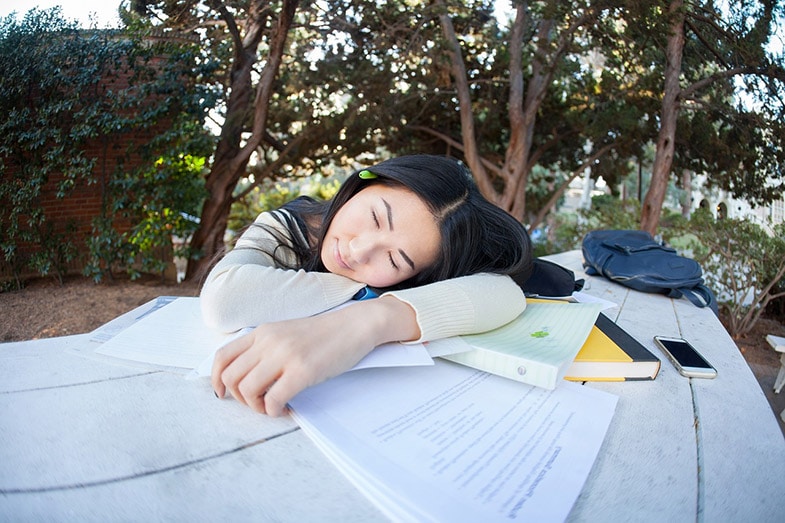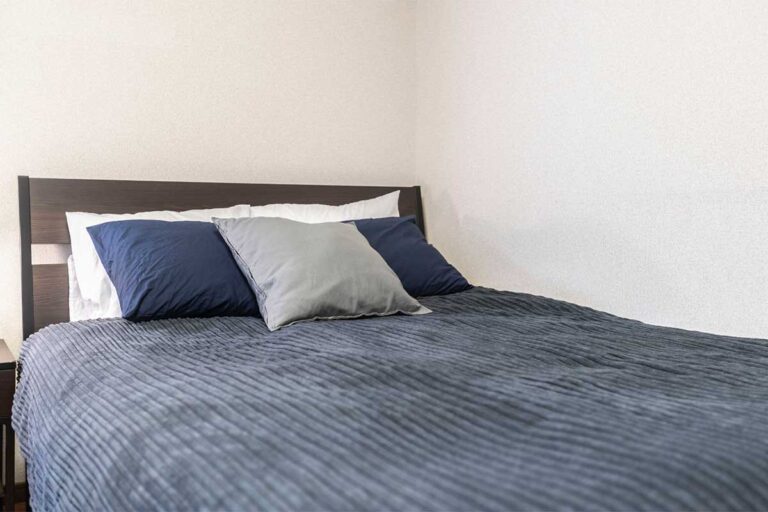Is 6 Hours of Sleep Enough for a Student?
Disclosure: We may get commissions for purchases made through links in this post.
Midterms are coming up and papers are due. It’s that time of year where sleep is given up for that extra bit of study time. We’ve all been told to get 8 hours every night, but for the average life of a student, this may be a challenge.
Is 6 hours of sleep enough for a student? The National Sleep Foundation recommends young adults get at least 6 hours of sleep each night, ideally 7 to 9 hours. It’s important to note that everyone functions differently. Some students can do well on 6 hours of sleep, however, most of us need more.

Sleep and Academic Performance
Being a student means staying sharp, and a good night of rest can be the difference between passing or failing a test. One of the many important functions of sleep is memory consolidation. As we absorb information throughout the day, our minds are at work, storing and processing information. Once we go to sleep, our cognitive abilities strengthen, allowing us to remember what we previously learned and experienced. So next time you need to cram for a test, catch some shut-eye instead. Those who sleep less than the recommended 7 to 9 hours are usually slower or more tired than those that get more, who have a higher level of focus and energy. Getting enough sleep not only strengthens the body on a physical level, but prepares it mentally for school related activities.
Some of the benefits include:
- Higher energy levels
- Better decision-making
- Greater concentration
- Stronger immune system
Getting enough sleep is critical for staying awake and alert for long periods of time. With a lack of sleep, a student’s attention span and level of concentration decreases, resulting in poorer grades. This is especially prevalent in reading, writing, and math classes, where a higher degree of focus is required. Students who have different sleeping patterns such as sleep more on weekends and less during week days will generally have worse grades. This is primarily from having to constantly adjust their body clock routines.
College students generally don’t get as much sleep as they should, which can negatively affect their academic performance. Reasons why relate to constant changes in sleeping patterns, pulling all-nighters, working late at a job, and a major one – too much screen time before bed. Evidence shows that students who sleep more have better grades than those that do not. Being able to juggle multiple things while getting a good night’s rest can make a huge impact on a student’s performance.
How Much Sleep Should College Students Get?
Not getting enough sleep is common with students. There’s a lot on their plate with classes, sports, and social-life. It’s important to understand how a good night of rest can help make the school year a successful one. College students should get at least 6 hours of sleep per night. Here are some tips on getting the most out of sleep.
Get into a schedule: Try to sleep 8 hours a night, especially before tests and exams. The body clock needs a regular schedule to perform well. During the night, it undergoes several processes to repair and re-energize the body so that it can function optimally the next day. Even just one all-nighter can throw off the body clock for an entire week. It will be difficult to adjust it back.
Do the bulk of your studying either first thing in the morning between 6AM to 11AM or in the afternoon between 2PM to 6PM. Avoid late nights. In the morning, there won’t be as many distractions as there might be later in the day. In the afternoon, the brain is most active, functioning at an optimal level. Try to not study past 9PM. Instead, make this the time to rest your eyes and prepare for sleep.
Avoid sugary foods and caffeine: Having a late night, sugary snack can keep you awake for several hours and cause stomach problems throughout the night. Avoid caffeinated drinks such as coffee and soda at night since it increases brain wave activity and can remain in the system for about 6 hours. If you need your daily dose of coffee, have your last one before 3PM.
Turn off electronics: Put down the electronics or shut them off. The light from these devices can damage the eyes, especially if used in the dark. When using your phone at night, the brain is constantly distracted, instead of preparing the body for rest.
Take proper naps: If you only get 6 hours of sleep per night, consider having a quick nap between classes. If you ever feel groggy or slow after a nap, this means it wasn’t done properly. A nap should only be about 20 minutes and done in the early afternoon to not alter your sleep schedule.
Quality Versus Quantity of Sleep
When it comes to a better sleep, the question normally asked is how long one should sleep for. It is always quantitative since it is easy to measure. Rather than focus on the amount of hours, examine the quality of your sleep. Maybe it was for 8 hours, but most of it was spent tossing and turning or frequently waking up. There are so many recommendations on how long one should sleep for, but each person is different. It’s important to analyze yourself, and determine whether you feel well rested after 6 hours, or need more.
Sleep quality, or sleep hygiene, is determined by how well your sleep. Ask yourself some of these questions to better understand the issues in your sleep.
- “How quickly do I fall asleep after laying down?”. If it takes longer than 45 minutes, you may need to analyze your activities prior to going to bed.
- “Do I wake up in the middle of the night?”. If it’s more than once, there may be something affecting your sleep such as a recurring noise, the temperature, or a health related issue.
- “How do I feel in the morning?”. If you find it extremely difficult to get out of bed, or have a headache every morning, analyze your diet, habits, and daily activities to pinpoint what’s causing poor sleep.
Sleep quantity is a good starting point since it is easy to evaluate and compare numbers. Sleep quality is more difficult to assess since so many factors contribute to it. It is however, just as important to take into account when achieving a good night of sleep.
Sleep Deprivation
Sleep Deprivation is the state of not having enough sleep. It has negative effects on the brain and its ability to perform cognitive functions. Sleep deprivation can either be chronic or acute, depending on how frequent it occurs. One will notice various changes to their body with an absence of sleep. This includes general fatigue, weight gain or weight loss, less energy and poor motor skills. It is also tougher to make decisions, a critical function for students who have o make important choices daily.
Sleep deprivation is common among students. Not only are they not getting enough hours in, but lack sleep quality. This relates to following a consistent schedule and maintaining habits around getting a good night’s rest. Major contributors of sleep deprivation for students include caffeine and technology. The blue light from phone screens in particular, makes it difficult for the brain to go into a restful state.
Dangers of Pulling All-Nighters
Staying up all night to cram for a test is not a good idea for overall health, even it’s a once in a while occurrence. Lack of sleep greatly affects your mood, focus, and energy levels, which are critical for learning in school. We’ve all done it at some point and know very well the feeling of getting absolutely no sleep. You’re slower, both mentally and physically. Although it may not cause any permanent health issues (unless it is a common problem), it may lead to impaired judgement and making hazardous decisions. Reaction time is affected and it is harder to solve problems. Since the body would lack energy, you may find yourself eating more than you would normally to regain that missing energy. Brain activity slows down significantly which causes a sluggish feeling the following day.
An all-nighter may seem like a good idea before the big exam, however, it might actually hurt your chances of getting a good grade. With no sleep, your memory is affected. The brain doesn’t get a chance to rest and retain the information it accumulated throughout the night. If you find yourself working really late on a difficult problem you just can’t solve, recognize that this is your brain telling you that it needs rest and cannot process well anymore. Don’t stay up all night, instead, get some sleep and tackle the problem in the morning. You might find that you solve it quicker than you thought. This is because the brain was able to retain memories from the previous day and allow you to subconsciously form new ones, making problem solving that much easier.
Conclusion – Is 6 Hours of Sleep Enough for a Student?
So if you’re wondering how much sleep college students should get, the answer is at least 6 hours. 7 to 9 hours is optimal for most, but if you can thrive on less, than it should be okay. Listen to your body, and remember that getting a good amount of sleep if crucial to acing that exam.






